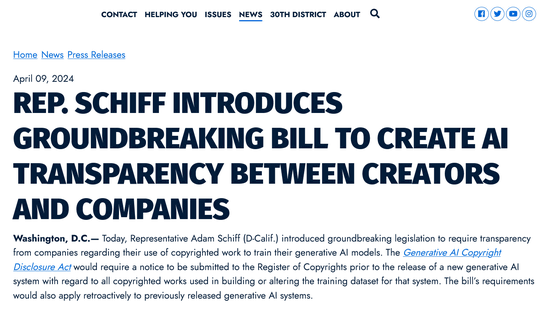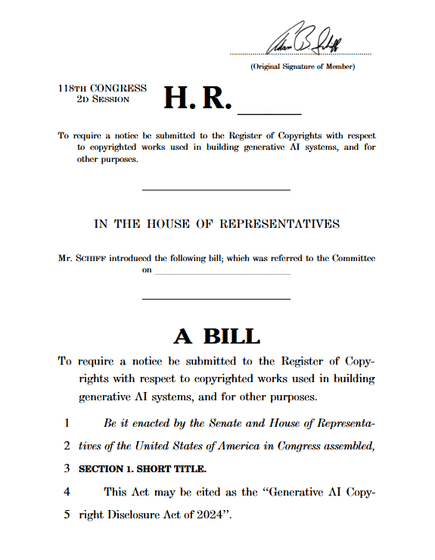A proposal for a 'Generative AI Copyright Disclosure Act' that would require disclosure of materials used to train generative AI has been submitted

Democratic Congressman Adam Schiff has introduced a bill called the Generative AI Copyright Disclosure Act, which would require AI companies to disclose the copyrighted material they use in developing their generative AI models. The bill was born out of concerns that AI companies are misusing copyrighted content to develop their tools.
Rep. Schiff Introduces Groundbreaking Bill to Create AI Transparency Between Creators and Companies
https://schiff.house.gov/news/press-releases/rep-schiff-introduces-groundbreaking-bill-to-create-ai-transparency-between-creators-and-companies

Generative AI Copyright Disclosure Act - the_generative_ai_copyright_disclosure_act.pdf
(PDF file) https://schiff.house.gov/imo/media/doc/the_generative_ai_copyright_disclosure_act.pdf

New Bill to Require Disclosure of Songs Used in Generative AI Training
https://www.billboard.com/business/legal/federal-bill-ai-training-require-disclosure-songs-used-1235651089/
The Generative AI Copyright Disclosure Act proposed by Senator Schiff would require AI companies to submit copyrighted works contained in their training datasets to the Copyright Registry before releasing a new generative AI system. Datasets can include text, images, music, and movies. The deadline for submission is at least 30 days before releasing the AI tool. Failure to submit or late submission will result in penalties.
The Generative AI Copyright Disclosure Bill does not seek to prohibit the use of copyrighted material to train AI, but it would impose significant burdens on companies developing generative AI that requires training on large datasets, such as large-scale language models or image generation AI.

According to the foreign media BillBoard, the Generative AI Copyright Disclosure Bill has the support of many organizations and unions, including the Recording Industry Association of America (RIAA), the National Association of Professional Photographers, the Screen Actors Guild, and the American Federation of Television and Radio Entertainers (SAG-AFTRA). Duncan Crabtree-Ireland, National Executive Director of SAG-AFTRA, commented, 'Everything generated by AI ultimately comes from human creation. That's why we must protect human creative content, that is, intellectual property.'
OpenAI, which develops GPT-4 and DALL-E, argued in a submission to the UK government in early 2024 that 'legally, copyright law does not prohibit AI learning.' In its submission, OpenAI also said that without access to copyrighted works, its tools would not function. AI companies argue that 'without access to copyrighted works, our tools would not function,' which could hinder the development of AI technology.
'AI has the disruptive potential to transform our economy, our political systems, and our daily lives. We must balance AI's enormous potential with the importance of ethical guidelines and protections. My Generative AI Copyright Disclosure Act is an important step in this direction. This bill will promote innovation while protecting the rights and contributions of creators. It will ensure that creators know when their work is being used in AI training datasets. This is about respecting creativity in the age of AI and balancing technological progress with fairness,' said Senator Schiff.
While new technologies like AI offer boundless opportunity — we must also ensure creators and their copyrighted work are protected. pic.twitter.com/9rrI2xPuj7
— Adam Schiff (@RepAdamSchiff) April 10, 2024
A similar bill was also submitted in December 2023.
A bill to require disclosure of AI model training data will be introduced - GIGAZINE

Related Posts:







